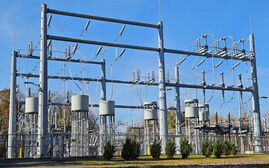Processing Your Payment
Please do not leave this page until complete. This can take a few moments.
- News
-
Editions
View Digital Editions
Biweekly Issues
- May 13, 2024
- April 29, 2024
- April 15, 2024
- April 1, 2024
- March 18, 2024
- March 4, 2024
- February 19, 2024
- February 5, 2024
- January 22, 2024
- + More
Special Editions
- Lists
- Viewpoints
- HBJ Events
- Business Calendar
- Custom Content
Regulators split on vote approving $103M Eversource storm settlement
 PHOTOS | CONTRIBUTED
Eversource crews at work in the wake Tropical Storm Isaias, which knocked out power to over 1 million Connecticut residents in 2020.
PHOTOS | CONTRIBUTED
Eversource crews at work in the wake Tropical Storm Isaias, which knocked out power to over 1 million Connecticut residents in 2020.
Connecticut’s utility regulator on Wednesday signed off on a state settlement with Eversource Energy over its handling of Tropical Storm Isaias last year, but without the blessing of its highest-ranking member.
Marissa Gillett, chair of the state Public Utilities Regulatory Authority, voted against her agency’s acceptance of the $103.4 million plan, which was brokered earlier this month by the administration of Gov. Ned Lamont and Attorney General William Tong. In a detailed written dissent, Gillett argued that the pact does not go far enough in holding Eversource to account for past shortcomings and could undermine public confidence in the regulatory body’s work.
“Despite the best intentions of the parties, in my opinion, the settlement falls short of its laudable objectives of enhancing local control, providing long term ratepayer relief and accountability,” she wrote.
Gillett acknowledged that the settlement represents “the collective will of the parties” involved and said she will “work diligently” to ensure it is enforced, but reserved criticism for the way regulators have overseen and dealt with electricity rate-setting and other issues in the past.
PURA Vice Chairman John Betkoski and Commissioner Michael Caron voted in favor of the deal, allowing its terms to come into effect.
The agreement directs Eversource to return $65 million to customers in the form of two rate credits on their December and January bills. The state secured a commitment from Eversource not to apply for a rate increase until at least January 2023, for rates that could not go into effect before January 2024.
Additionally, the company agreed not to appeal a $28.4 million penalty levied by the Public Utilities Regulatory Authority as part of the agency’s review of the response to Isaias.
The storm, which struck in August 2020, left hundreds of thousands of people without power, some for days on end. The pace of electric service restoration, and an apparent lack of communication between towns and their utilities, triggered intense backlash against Eversource and to a lesser extent United Illuminating Co., and prompted the attorney general’s office and PURA to launch investigations.
The remaining $10 million included in the settlement will be used to assist customers who are having difficulty paying their utility bills, according to state officials.
Eversource will also be required to create a new post — a Connecticut-based president of Connecticut Light & Power — and add new seats to its governing board for representatives from Connecticut, changes Lamont has said will strengthen local control and improve the company’s responsiveness.
“We are pleased PURA approved the settlement which provides immediate, tangible relief for our customers as we continue to deal with COVID-19 and prepare for winter, as well as long term benefits for Connecticut,” said Eversource spokesperson Tricia Modifica. “We learned valuable lessons as a result of Tropical Storm Isaias and have made numerous improvements that have changed how we respond to communities and communicate during storms. We look forward to moving on and winning over ‘hearts and minds’ in Connecticut by demonstrating our commitment to both customers and Connecticut leadership, at a time when we must work together to deliver a new clean energy future.”
In her dissent, Gillett pointed out that Eversource’s Connecticut-based president will remain accountable to an Eversource-controlled board of directors, and that the new “independent” seats will be outnumbered by company executives, making any tangible benefits from the restructuring “nebulous at this stage.”
Gillett said inclusion of the term “rate freeze” in the agreement could unintentionally mislead consumers, because it applies to distribution prices, one of several components on a customer’s bill. Other costs, which PURA is largely obligated to approve, together with an expected spike in natural gas prices, are outside of the pact’s control.
“At best, the public will be confused as to why the authority has ‘allowed’ these rate increases when the settlement has negotiated a rate freeze, and at worst, this confluence of events may undermine the public’s confidence in the public bodies entrusted with ensuring affordable rates, which is ultimately to no one’s benefit,” she said.
The chair also worried that PURA had forfeited one of its most effective tools in guiding changes to utilities’ behavior — reductions to a firm’s return on equity.
“Allowing Eversource to dispose of its obligations imposed by the authority’s decisions in our Tropical Storm Isaias dockets through a one-time, lump sum cash infusion does achieve the collective goals of finality and closure, and also removes the litigation risk from the equation (i.e. the risk that Eversource would have prevailed in its appeal of the authority’s decisions),” Gillett wrote. “But, I worry that this will not be the last time that we are in this situation – more devastating storms will come to pass – and a tool such as a ROE reduction would more acutely encourage Eversource’s executives to properly prepare for and respond to such storms. Simply put: sometimes it is worth going to the mat, and I am apprehensive of a future where we still do not have a court-backed interpretation of PURA’s regulatory authority in holding utilities accountable following a storm event.”

2022 Giving Guide
This special edition informs and connects businesses with nonprofit organizations that are aligned with what they care about. Each nonprofit profile provides a crisp snapshot of the organization’s mission, goals, area of service, giving and volunteer opportunities and board leadership.
Learn more
Subscribe
Hartford Business Journal provides the top coverage of news, trends, data, politics and personalities of the area’s business community. Get the news and information you need from the award-winning writers at HBJ. Don’t miss out - subscribe today.
Subscribe
2024 Book of Lists
Delivering Vital Marketplace Content and Context to Senior Decision Makers Throughout Greater Hartford and the State ... All Year Long!
Read Here-
2022 Giving Guide
This special edition informs and connects businesses with nonprofit organizations that are aligned with what they care about. Each nonprofit profile provides a crisp snapshot of the organization’s mission, goals, area of service, giving and volunteer opportunities and board leadership.
-
Subscribe
Hartford Business Journal provides the top coverage of news, trends, data, politics and personalities of the area’s business community. Get the news and information you need from the award-winning writers at HBJ. Don’t miss out - subscribe today.
-
2024 Book of Lists
Delivering Vital Marketplace Content and Context to Senior Decision Makers Throughout Greater Hartford and the State ... All Year Long!
ABOUT
ADVERTISE
NEW ENGLAND BUSINESS MEDIA SITES
No articles left
Get access now
In order to use this feature, we need some information from you. You can also login or register for a free account.
By clicking submit you are agreeing to our cookie usage and Privacy Policy
Already have an account? Login
Already have an account? Login
Want to create an account? Register
Get access now
In order to use this feature, we need some information from you. You can also login or register for a free account.
By clicking submit you are agreeing to our cookie usage and Privacy Policy
Already have an account? Login
Already have an account? Login
Want to create an account? Register









0 Comments